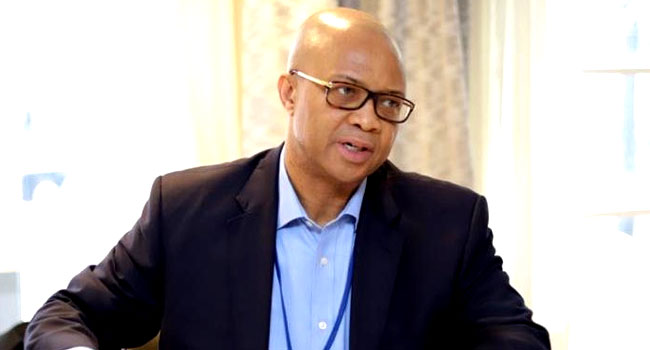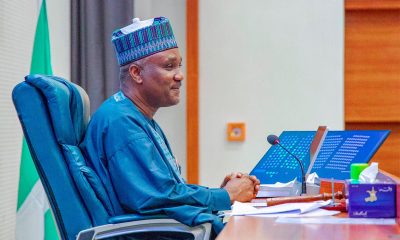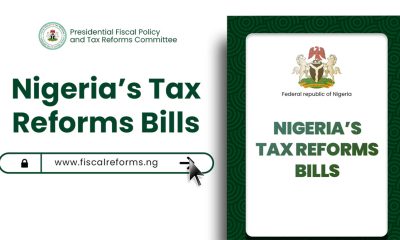Business
FG: Fuel Subsidy to Go in Second Half of 2022

The federal government has explained that the current subsidy regime on petroleum motor spirit (PMS), which is covered under the ‘Cost Recovery’ mechanism of the Nigerian National Petroleum Corporation (NNPC) would end in the first half of 2022.
The Director General of the Budget Office of the Federation (BoF), Mr. Ben Akabueze, disclosed this in Abuja yesterday during an interactive session with journalists, civil society organisations and other stakeholders on the 2022 budget proposals.
Akabueze explained that fuel subsidy exerts enormous strain on government finances and does not benefit the poor for which they are targeted, adding that the elite enjoy 80 per cent of subsidy.
The DG Budget stated that the revised 2022-24 Medium Term Expenditure Framework (MTEF) was premised on a hybrid of January-June which is anchored on the current fiscal regime with provision for cost recovery by the state oil company, as well as July-December based on the Petroleum Industry Act (PIA) fiscal regime.
According to him, by the second half of 2022, the NNPC would transit fully and operate as a full commercial entity funding its operations and maximising its gross revenues.
READ ALSO:
- Nigeria, others to get malaria vaccine by first quarter of 2022 –AHM
- Osun govt to conduct integrity tests on ‘model schools’ built by Aregbesola
- ICPC to arraign ex-FIIRO DG for taking 18 years’ salaries with fake certificate
- BREAKING: Man confesses to killing Vanguard reporter, Tordue Salem
Akabueze, who spoke extensively on the proposed N16.39 trillion budget, noted that 34.8 per cent of projected revenues is to come from oil-related sources while 65.2 per cent is to be earned from non-oil sources.
He pointed out that the combined expenditure of the federal, state and local governments was less than 15 per cent of Gross Domestic Product (GDP).
According to him, the biggest challenge stems from low revenue, lamenting that about 40 million of the 70 million Nigerians who should be in the tax pool were not paying taxes.
He said, “It is absolutely critical that we fix our revenue challenge because oftentimes people just say cut expenditure. The truth is cutting expenditure is not currently a viable option for two main reasons. Number one, our public expenditure to GDP ratio is about the lowest even on the continent of Africa.
“As a country, our public expenditure to GDP ratio is under 15 per cent. Even on the continent of Africa, that ratio, the average is over 30 per cent. The global average is over 30 per cent. I am talking of the whole of government – federal, state and local governments. The reality is that in aggregate, governments in Nigeria are not spending too much, they are actually spending too little.
“So, the solution is not to cut government spending. The solution is to make government spending more efficient and actually increase the scope for the government to be able to spend more because our public expenditure to GDP is so low. That is why the delivery of public goods and services is weak.”
Akabueze argued that there is correlation between low public expenditure to GDP ratio and low revenue to GDP ratio.
He further stated that the government’s revenue to GDP was also among the lowest in Africa.
Akabueze observed that many stakeholders had advocated a cut in personnel cost which currently stands at about N4.1 trillion to address revenue challenges, arguing that doing so was not an option.
This, he noted, is because public sector wages are already low compared to the private sector.
On the implementation of the Stephen Oronsaye Report which recommended the scrapping of some government agencies to save cost, Akabueze said the government was still considering the option, adding that another committee had been set up to look into it.
On the alleged duplication of some projects in the FGN 2022 budget proposal, he stated that a review of the claims in some quarters indicated that most, if not all the projects are not duplications.
He added: “For instance, two projects with the same narration and located in the same geo-political zone are not necessarily the same. They may be in different states, local government areas or communities.
“However, errors (including duplications, if any) in the budget, which must be within a reasonable margin of error, are corrected during the enactment process,” he said.
Also dispelling allegations of opacity in the composition of Statutory Transfers, and that they are stated as lump sum provisions without details especially the budget of the National Assembly, Akabueze said it was important to note that Nigeria is a constitutional democracy.
“The budget details presented to the National Assembly are those of the executive arm of the federal government. We can only encourage other arms of government to publish their budget details for public scrutiny. We believe the public deserves to have these details, and will support your advocacy in this regard.
“Indeed, the Budget Office of the Federation has implemented several reforms to deepen citizens’ participation, transparency and access to budget information.”
Thisday
Railway
Lagos Rail Mass Transit part of FG free train ride – NRC

Lagos Rail Mass Transit part of FG free train ride – NRC
The Nigerian Railway Corporation (NRC) has disclosed that the Lagos Rail Mass Transit (LRMT) trains are included in the Federal Government’s free train ride initiative for the Christmas and New Year celebrations.
The LRMT, which currently includes the Phase 1 Blue Line Rail and the Phase 1 of the Red Line Rail, operates under the Lagos Metropolitan Area Transport Authority (LAMATA).
This announcement was made by Ben Iloanusi, the Acting Managing Director of the NRC, during an interview on NTA News TV on Friday, following the launch of the initiative earlier that day.
While Iloanusi stated that Phase 1 of both the Blue Line and Red Line Rail projects are part of the program, LAMATA has yet to confirm this inclusion.
READ ALSO:
- Nigeria denies alleged plot to destabilise Niger Republic
- Navy arrests 19 Nigerians attempting to reach Europe by hiding on ship
- Troops arrest four Ambazonian rebels in Taraba
Iloanusi outlined the other routes benefiting from the scheme, which include the Lagos-Ibadan Train Service, Kaduna-Abuja Train Service, Warri-Itakpe Train Service, Port Harcourt-Aba Train Service, and the Bola Ahmed Tinubu Mass Transit in Lagos. Notably, little was previously known about the Bola Ahmed Tinubu Mass Transit service until this disclosure.
“Let me mention the routes where this free train service is happening. We have the Lagos-Ibadan Train Service, we have the Kaduna-Abuja Train Service, we have the Warri-Itakpe Train Service, we have the Lagos Rail Mass Transit trains, we have the Port Harcourt-Aba Train Service, and we have what we call the Bola Ahmed Tinubu Mass Transit, which is also in Lagos,” he stated.
Iloanusi provided operational updates, stating that passengers nationwide can access free tickets online or, for those unable to do so, at train stations where they will be profiled and validated.
He noted that passengers using NRC-managed services (excluding the Lagos Rail Mass Transit) should reserve tickets via the official website, www.nrc.gov.ng, with a valid ID required. He also advised travelers to plan, arrive on time, and bring valid identification.
Lagos Rail Mass Transit part of FG free train ride – NRC
Business
NNPC denies claim of Port Harcourt refinery shutdown

NNPC denies claim of Port Harcourt refinery shutdown
The Nigerian National Petroleum Company Limited (NNPCL) has denied claims in media reports that the newly refurbished Port Harcourt refinery has shut down.
The national oil company denied the claim in a press release issued by its Chief Corporate Communications Officer, Olufemi Soneye, on Saturday.
Soneye said the claim was false and urged Nigerians to disregard it. He stressed that the Port-Harcourt Refinery is fully operational.
READ ALSO:
- Like Ibadan, stampede claim 10 lives for Abuja Catholic church, 17 in Anambra
- Marketers react after NNPCL slashes petrol price to N899 per litre
- Electricity: We installed 184,507 meters, issued 50 licences in Q3, says FG
The statement read, “The attention of the Nigerian National Petroleum Company Limited (NNPC Ltd.) has been drawn to reports in a section of the media alleging that the Old Port Harcourt Refinery which was re-streamed two months ago has been shut down.
“We wish to clarify that such reports are totally false as the refinery is fully operational as verified a few days ago by former Group Managing Directors of NNPC.”
He noted that preparation for the day’s loading operation is currently ongoing, and added that claims of the shutdown are “figments of the imagination of those who want to create artificial scarcity and rip-off Nigerians.”
NNPC denies claim of Port Harcourt refinery shutdown
Business
CBN permits BDCs to buy up to $25,000 FX weekly from NFEM

CBN permits BDCs to buy up to $25,000 FX weekly from NFEM
The Central Bank of Nigeria (CBN) has granted Bureau de Change (BDC) operators temporary permission to purchase up to $25,000 weekly in foreign exchange (FX) from the Nigerian Foreign Exchange Market (NFEM).
The Central Bank of Nigeria (CBN) has granted Bureau de Change (BDC) operators temporary permission to purchase up to $25,000 weekly in foreign exchange (FX) from the Nigerian Foreign Exchange Market (NFEM).
This move, detailed in a circular dated December 19, 2024, is designed to meet seasonal retail demand for FX during the holiday period.
The circular was signed by T.G. Allu, on behalf of the Acting Director of the Trade and Exchange Department.
The arrangement will be in effect from December 19, 2024, to January 30, 2025.
Under the directive, BDCs may purchase FX from a single Authorized Dealer of their choice, provided they fully fund their accounts before accessing the market.
Transactions to occur at the prevailing NFEM rate
The transactions will occur at the prevailing NFEM rate, and BDCs are required to adhere to a maximum 1% spread when pricing FX for retail end-users.
READ ALSO:
- Badenoch’s negative portrayal of Nigeria Police unfair-PCRC
- Bitcoin price crashes to $95,000 as market continues to react to Federal rate cuts
- Bauchi high court dismisses blasphemy, cybercrime charges against Rhoda Jatau
All transactions conducted under this scheme must be reported to the CBN’s Trade and Exchange Department.
The circular read in part:
“In order to meet expected seasonal demand for foreign exchange, the CBN is allowing a temporary access for all existing BDCs to the NFEM for the purchase of FX from Authorised Dealers, subject to a weekly cap of USD 25,000.00 (Twenty-five thousand dollars only).
This window will be open between December 19, 2024 to January 30, 2025.
“BDC operators can purchase FX under this arrangement from only one Authorized Dealer of their choice and will be required to fully fund their account before accessing the market at the prevailing NFEM rate. All transactions with BDCs should be reported to the Trade and Exchange department, and a maximum spread of 1% is allowed on the pricing offered by BDCs to retail end-users.”
The CBN assured the general public that PTA (Personal Travel Allowance) and BTA (Business Travel Allowance) remain available through banks for legitimate travel and business needs.”
These transactions are to be conducted at “market-determined exchange rates” within the NFEM framework.
This initiative reflects the CBN’s strategy to stabilize the FX market and manage seasonal surges in demand.
CBN permits BDCs to buy up to $25,000 FX weekly from NFEM
-

 Railway1 day ago
Railway1 day agoLagos Rail Mass Transit part of FG free train ride – NRC
-

 metro13 hours ago
metro13 hours agoWhy we displayed ‘Jesus Christ is not God’ banner at Lekki mosque -Imam
-

 metro2 days ago
metro2 days agoCourt stops customs from seizing imported rice in open market
-

 metro3 days ago
metro3 days agoIbadan stampede: Tinubu orders probe as death toll hits 40
-

 metro2 days ago
metro2 days agoIbadan stampede: Ooni reacts after arrest of ex-wife
-

 metro1 day ago
metro1 day agoNIMC warns against extortion, reaffirms free NIN enrollment
-

 metro2 days ago
metro2 days agoAfe Babalola: Court grants Dele Farotimi bail, barred from media interviews
-

 News3 days ago
News3 days agoAdebayo Ogunlesi, 2 other Nigerians make Forbes 50 wealthiest Black Americans list 2024













